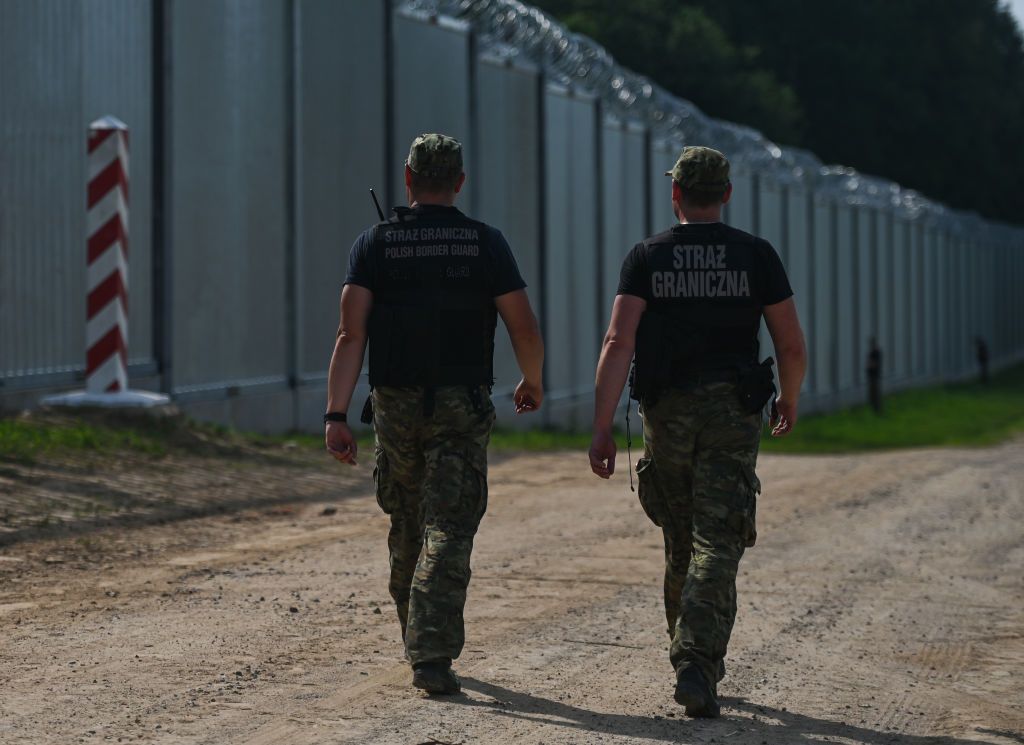Poland is planning to complete its fortified border wall and close the border with Belarus by next summer in an effort to combat what it perceives as Russia’s and Belarus’s “hybrid war” through illegal migration. The initiative comes after strained relations between Poland and Belarus, following the invasion of Ukraine. Poland has accused Belarus of orchestrating migrant flows into the country to pressure the EU over sanctions, a claim that Belarus denies. The border fortification project includes additional reinforcements along the 400-kilometer eastern border, such as night vision cameras, thermal imagers, and a new patrol road, as well as strengthening the existing five-meter steel fence built in 2022. Poland is investing over 2.5 billion zlotys ($611 million) in the project, with funding allocated by the current government led by Prime Minister Donald Tusk. Deputy Interior Minister Maciej Duszczyk expressed confidence that the migration route would be closed by next summer, improving the border security to “as close to 100% as possible.”
Tensions between Poland and Belarus escalated in May when a Polish border guard was critically injured by a migrant using a makeshift spear to breach the existing fence. In response, Prime Minister Donald Tusk announced plans to create a 200-meter-wide buffer zone along the border with Belarus. Despite the border fortification efforts, Deputy Interior Minister Maciej Duszczyk warned of potential attempts by Belarusian dictator Alexander Lukashenko to escalate tensions or sabotage Poland’s infrastructure. The move to strengthen the border comes amid concerns of Russia engaging in hybrid warfare near NATO borders. Ukrainian presidential adviser Andriy Yermak warned of the possibility of North Korean troops dressed in Russian uniforms or Iranian proxies appearing on the borders of NATO countries if Russia is not stopped. He emphasized the need to address the current situation to prevent unexpected foreign military involvement in Europe.
The ongoing border tensions between Poland and Belarus have raised concerns about the potential for further conflict in the region. Poland’s efforts to fortify its border and close off the migration route from Belarus reflect its commitment to addressing security threats posed by illegal migration and potential hybrid warfare tactics. The significant investment in border infrastructure highlights the seriousness with which Poland is approaching the situation, with the government allocating substantial funding to enhance border security measures. The completion of the fortified border wall and the closure of the migration route by next summer are expected to significantly improve the security of the eastern border and prevent unauthorized crossings.
The border fortification project in Poland is a response to what the country sees as a deliberate attempt by Belarus to use illegal migration as a tool to pressure the EU over sanctions. The strained relations between Poland and Belarus, exacerbated by the invasion of Ukraine, have led to increased border tensions and security concerns. The strengthening of the border wall and the implementation of additional security measures aim to prevent further incidents like the one in May when a Polish border guard was injured. Deputy Interior Minister Maciej Duszczyk’s assertion that the border security will be as close to 100% as possible once the project is complete underscores the government’s determination to protect its borders and prevent external threats.
As Poland continues to work on completing its fortified border wall and closing the border with Belarus, concerns persist about potential escalation and sabotage efforts by Belarusian authorities. The government’s proactive approach to enhancing border security reflects a broader strategy to address regional security threats and mitigate the impact of hybrid warfare tactics. The involvement of Ukrainian officials, such as presidential adviser Andriy Yermak, in highlighting the risks of foreign military intervention underscores the gravity of the situation and the need for international cooperation in addressing security challenges in the region. The completion of the border fortification project by next summer is expected to be a crucial milestone in securing Poland’s eastern border and safeguarding against illegal migration and hybrid warfare tactics orchestrated by neighboring countries.















